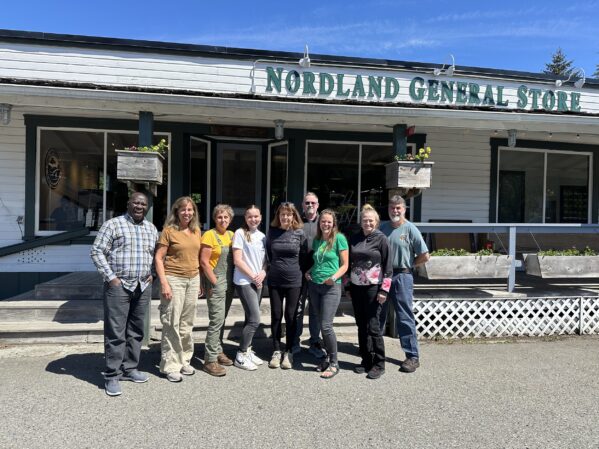Q&A with Nordland General Store: Built by the Community for the Community

With roots stretching back to 1922, the Nordland General Store has remained integral to the community of Marrowstone Island, a former trading post located off the coast of Washington state. But after a fire destroyed the store four years ago, the community banded together to rebuild, working with our PathLight Law team to restructure as a community operated and owned business.
In our Q&A with Nordland General Store Board Vice President Barcy Fisher, we explore how adopting the co-op model restored the store as a true community hub—owned, supported, and sustained by the people it serves—proving that shared ownership can deepen connection and collective investment in a thriving local future.
1. It’s been one year since Nordland General Store reopened as a community-owned cooperative — what stands out the most about this first year as a co-op?
What stands out most is the overwhelming amount of community support we have received from everyone! We exceeded our fundraising goals. We exceeded our community membership goals. We are exceeding our sales projections. Everyone who learns about the story of the little island general store that reopened (after a devastating fire) as a community co-op is thrilled to be a part of the story – as volunteers, as customers, as staff. Also…It takes an entire community to build a community store! In particular, for us it helped to have a handful of really dedicated and competent people steering us every step of the way – from working with PathLight to legally form the co-op to pitching the idea to community members and raising seed funding to building a fully functioning business with groceries and goods on the shelves within 18 months. We were lucky enough to have several very committed and passionate people leading us from formation to our first year anniversary, and without them taking on this challenge and dedicating their free time to making it happen, the Nordland General Store would not be the welcoming and warm community store it is today.
2. How has the co-op model helped strengthen your community?
The store is truly the center of our community now. Everyone feels that they are a part of its success, and everyone wants to contribute as customers and as volunteers. We would never have been able to raise the necessary funds or garner the necessary volunteer participation had we not been a co-op. People feel so good about supporting a store that is owned by everyone. It is why people want to come and shop at the store, and it’s why they keep coming back. It’s why the volunteers and the staff want to work so hard to make the store a wonderful place.
Everyone cares about supporting our community’s store and making sure it continues to exist for years to come. Everyone who walks into the store leaves feeling good about having connected to something bigger than themselves, and hopefully they leave with a bag full of delicious and healthy local and organic foods too!
3. PathLight Law supported you in forming the cooperative and raising community capital — how did that foundation shape your journey?
We knew we wanted to open a community store, but we had no idea what was the best path forward from a legal and business structure. Kim Arnone and PathLight Law helped us understand that a co-op model was available to us in Washington State. They outlined the process for us so that we could raise funds in a preliminary private raise and later offer member shares to the public. Having the simplified structure of a cooperative business where everyone has a vote was instrumental in getting most of our community on board with the project.
4. Looking ahead, what’s your vision for the store’s next chapter?
This first year has been all about learning how to run a food co-op on a small rural island in Washington state. We have had to face a lot of small hurdles and grow our understanding of the grocery business. For our next chapter, operationally, we will focus on the small incremental improvements over time – managing and improving our inventory, our waste, our margins. Community-wise, we look forward to growing our connections with the community through a variety of events throughout the year.
5. Any advice for other co-ops? Any challenges or benefits that organizers of similar
co-ops should know about?
Don’t give up! And welcome mistakes! We have faced hurdle after hurdle throughout the process of building and running the store, but we never took “no” for an answer. There is always a solution to every problem, and one has to be excited to figure out the work-arounds. Every single member of our team can point to one or two or more mistakes that we have made in building the store or ordering products. We welcome mistakes because it means that we are all trying and learning.
Also, our community newsletter is the glue that keeps all of our members connected, and the secret to its success is focusing on the people who come into our store every week. It’s all about the human connection that happens when people come and shop at our community store. Focus on the cool humans, and you will be golden!